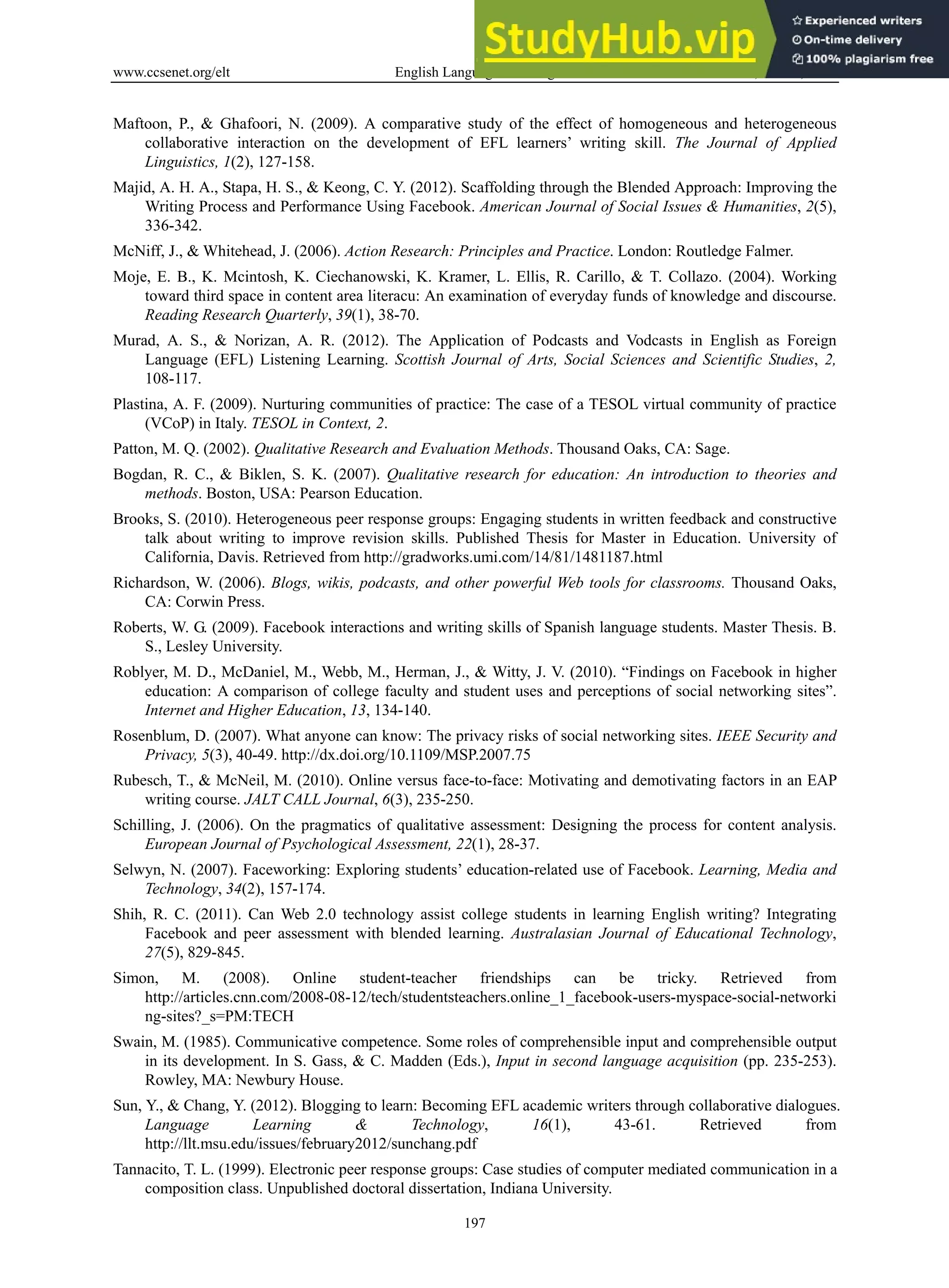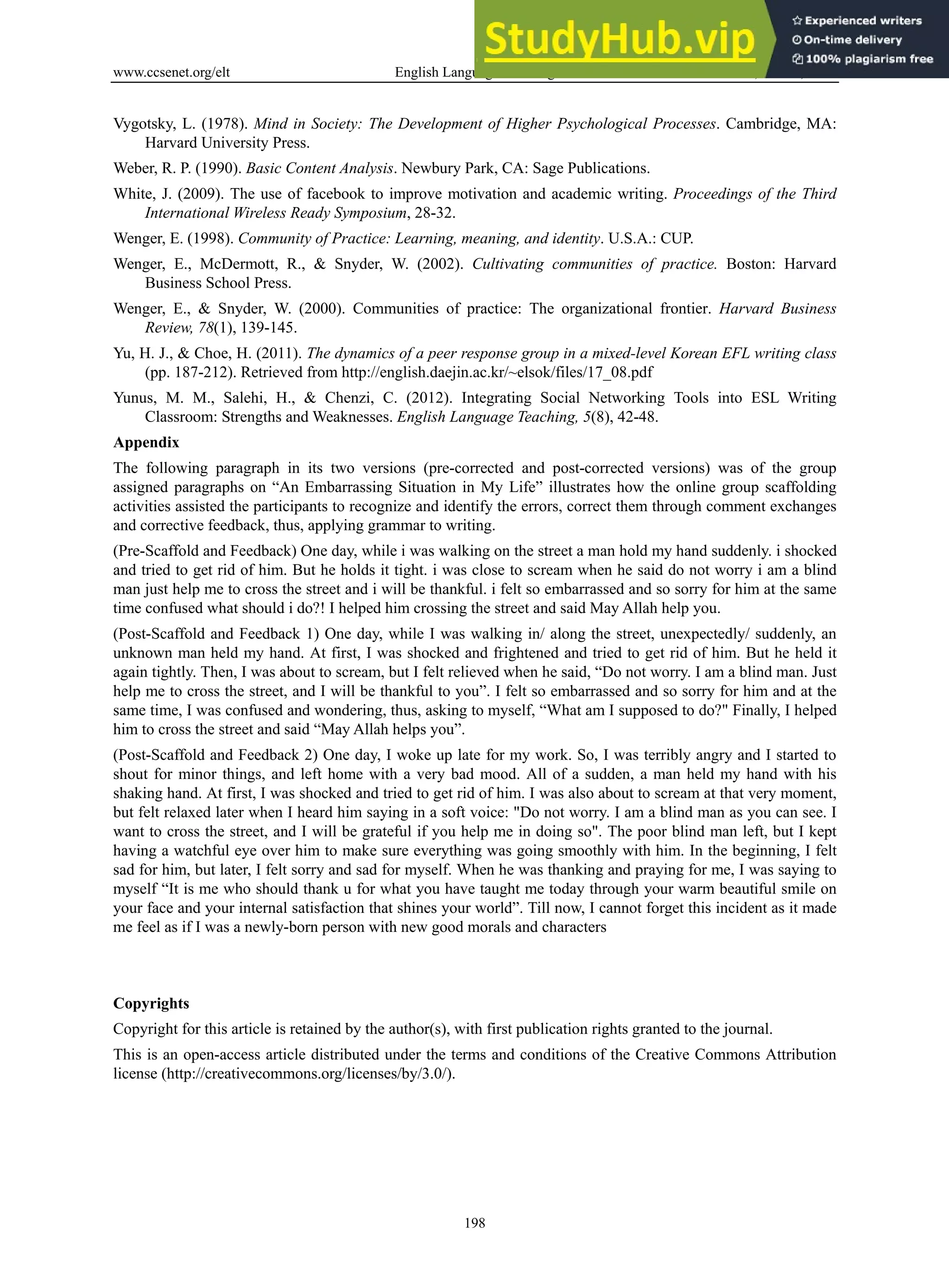This document discusses a study that investigated the opportunities and challenges of using social networking sites (SNSs) as learning environments for developing English writing skills among English as a foreign language (EFL) learners. The study examined 24 EFL learners who participated in a Facebook group for practicing English writing. The findings showed that participation and interaction increased over time as learners generated ideas, wrote paragraphs, and provided feedback to each other. However, the study also identified some challenges faced by learners in such online communities. The document provides background on theories of second language acquisition and communities of practice to frame the study.
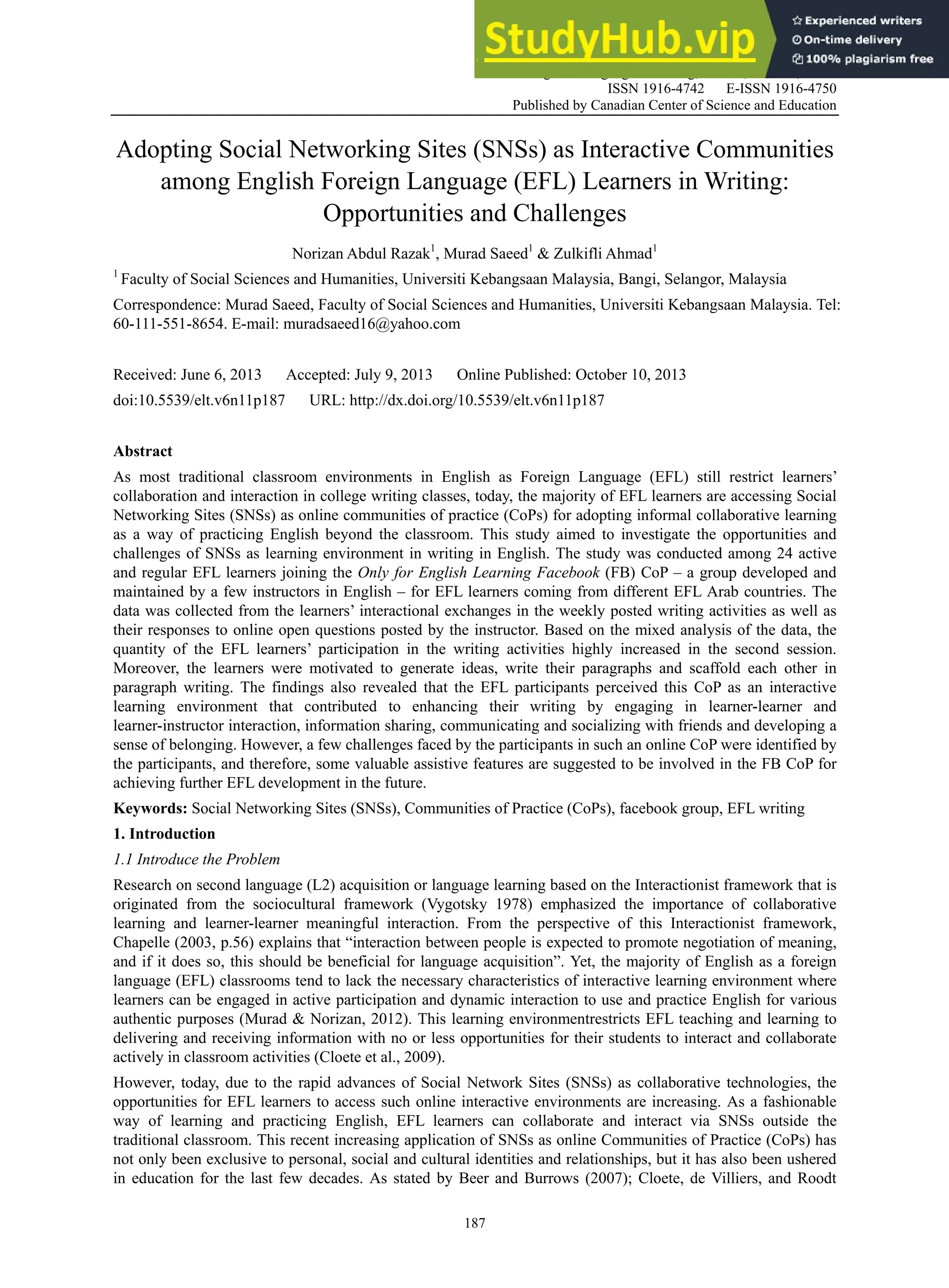
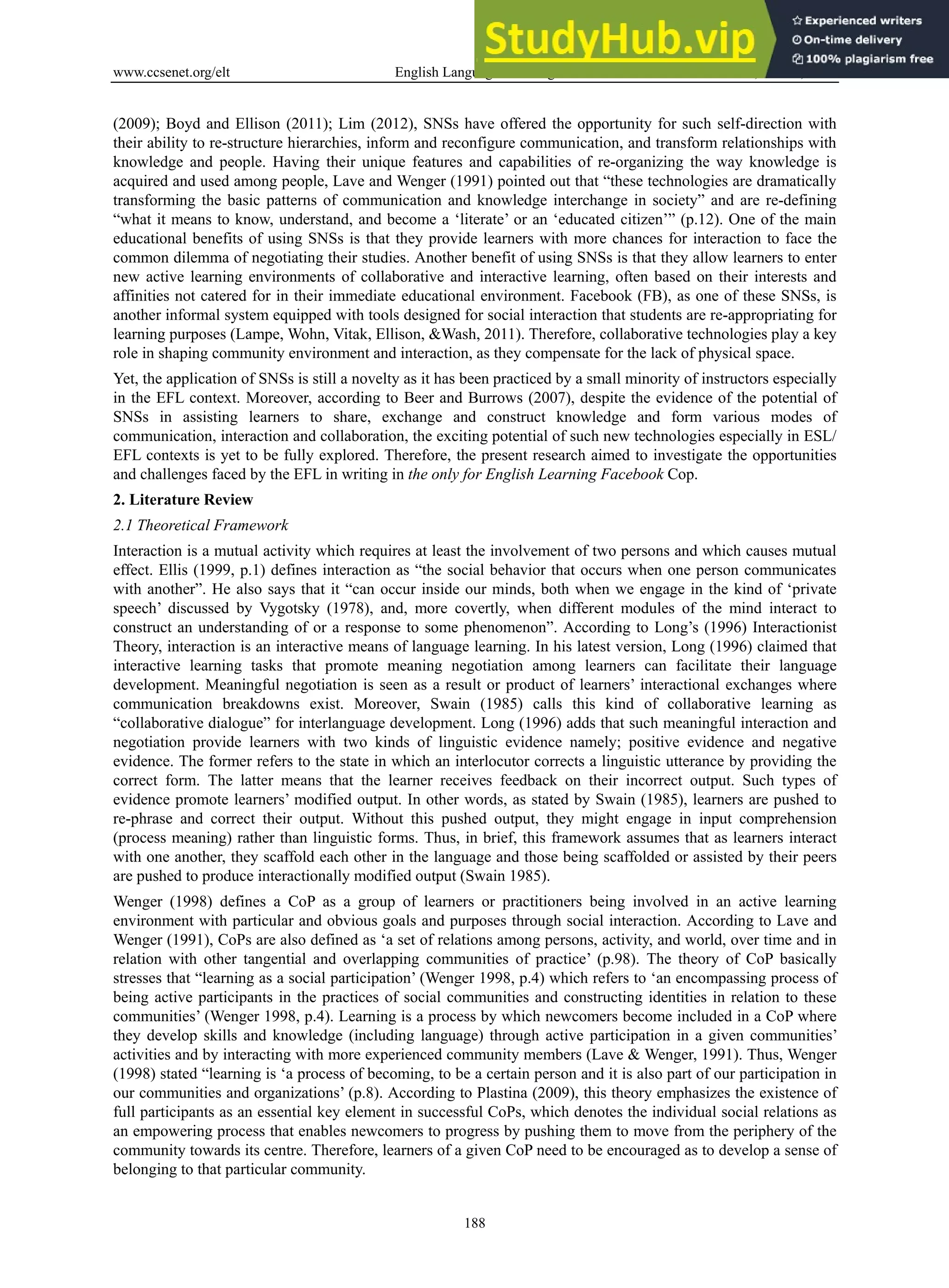
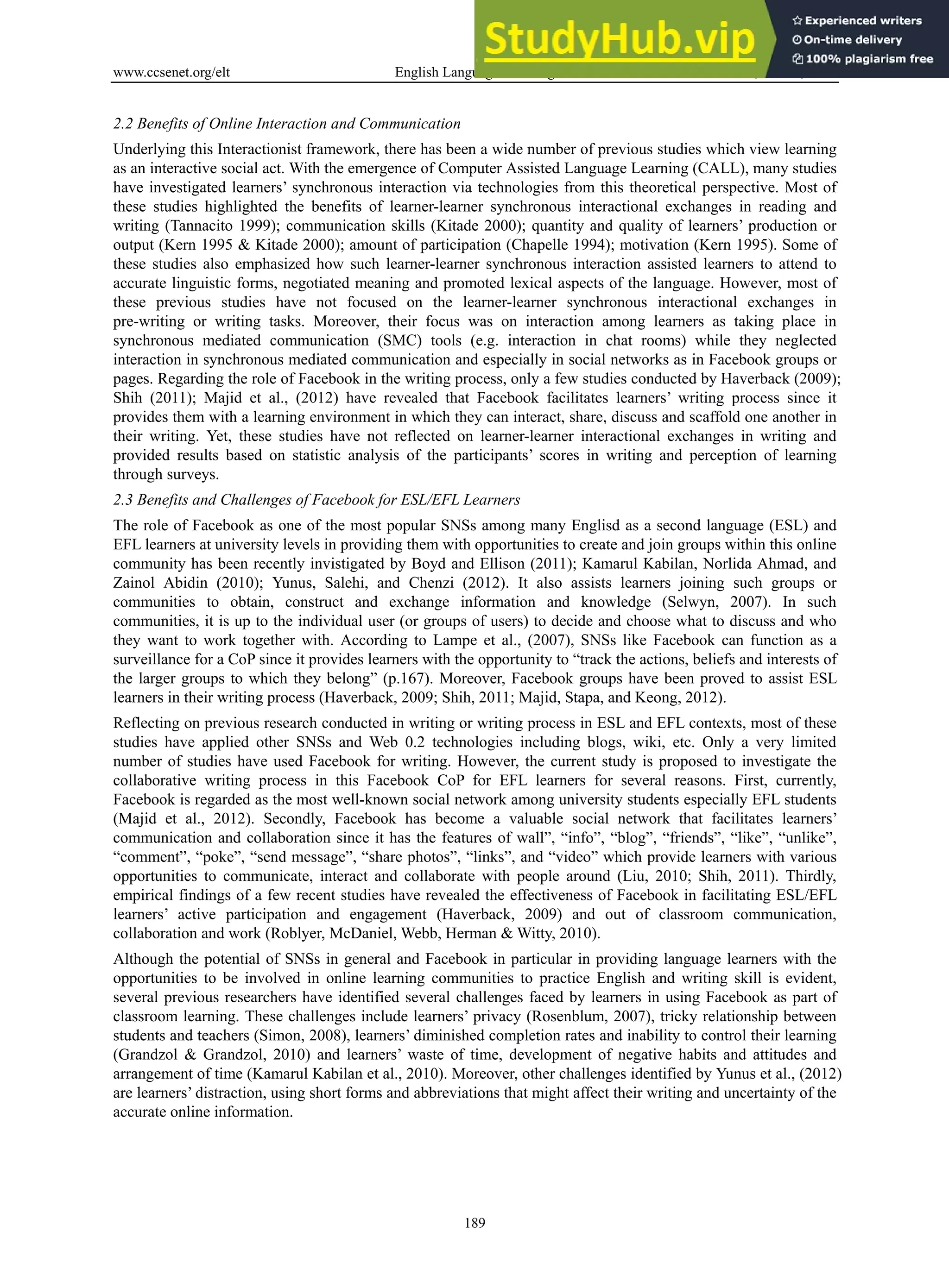
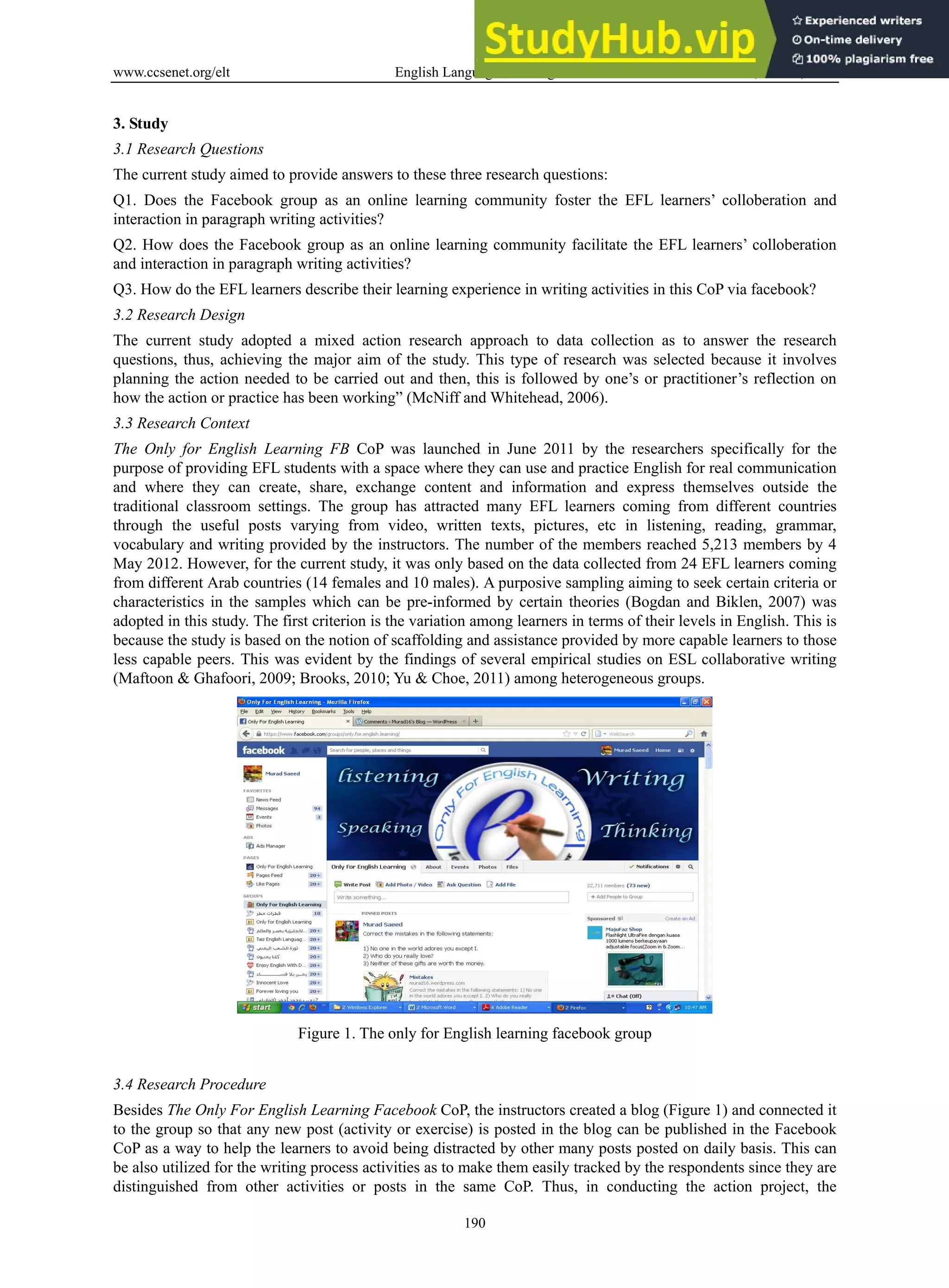
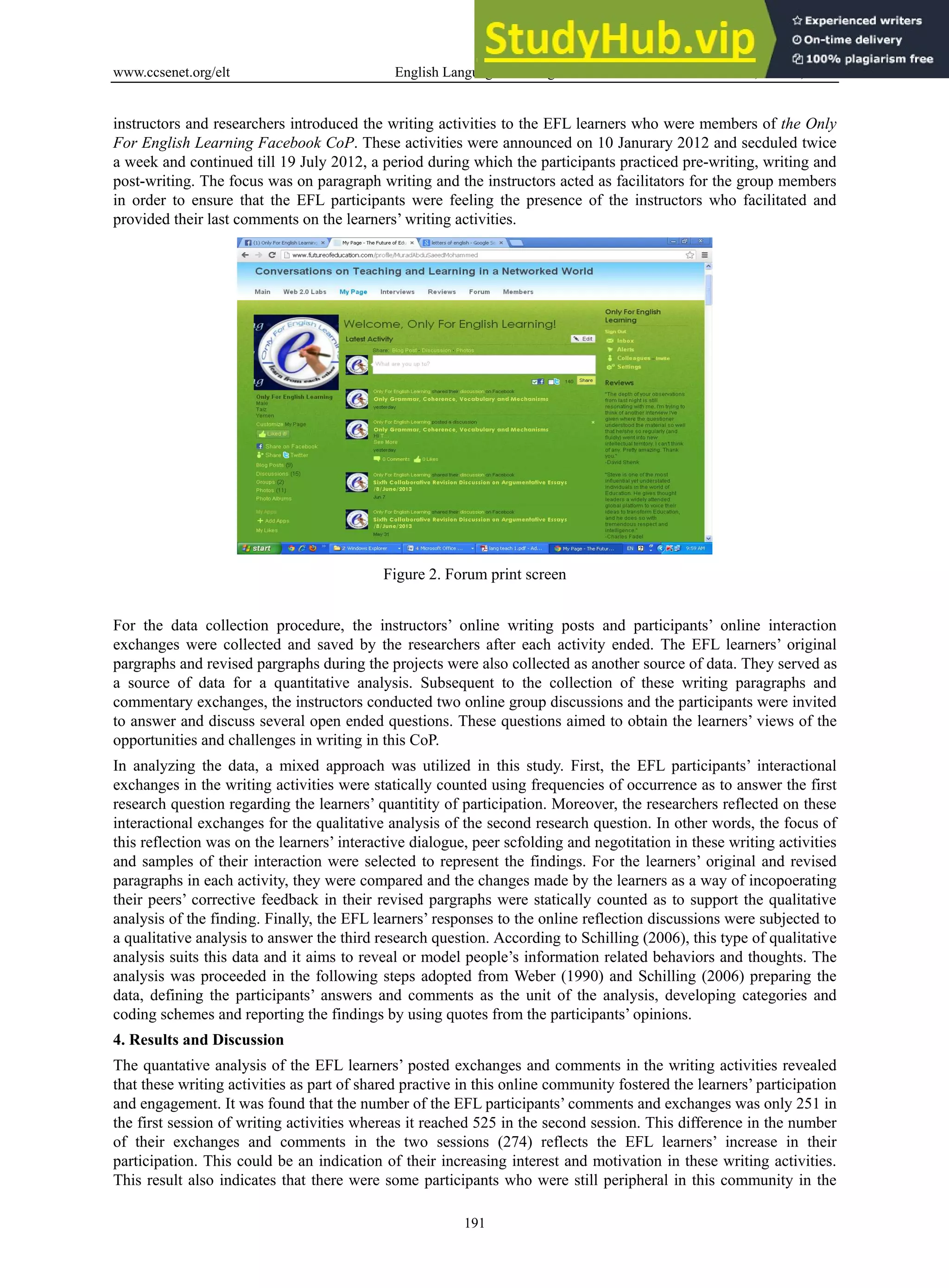
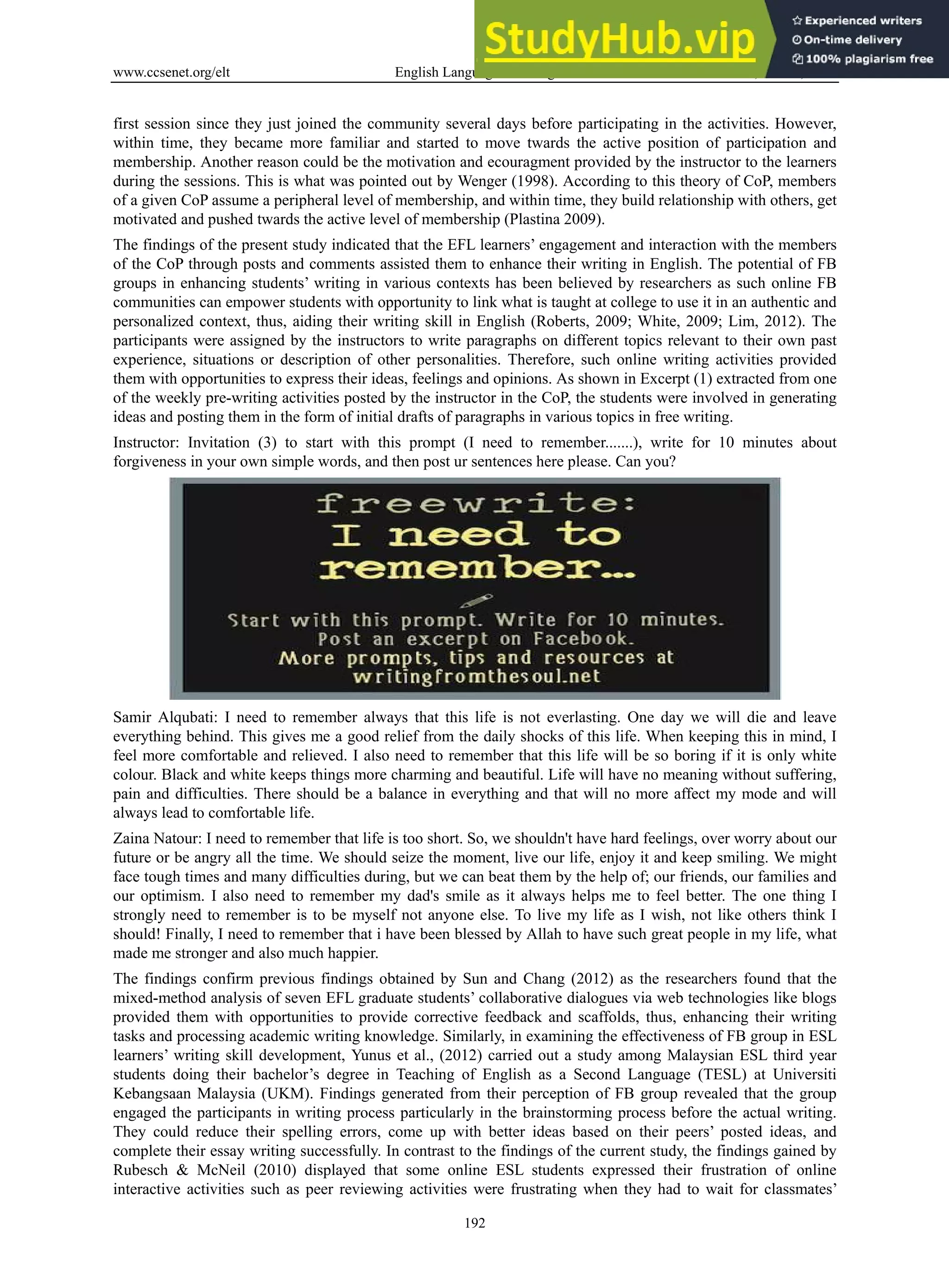
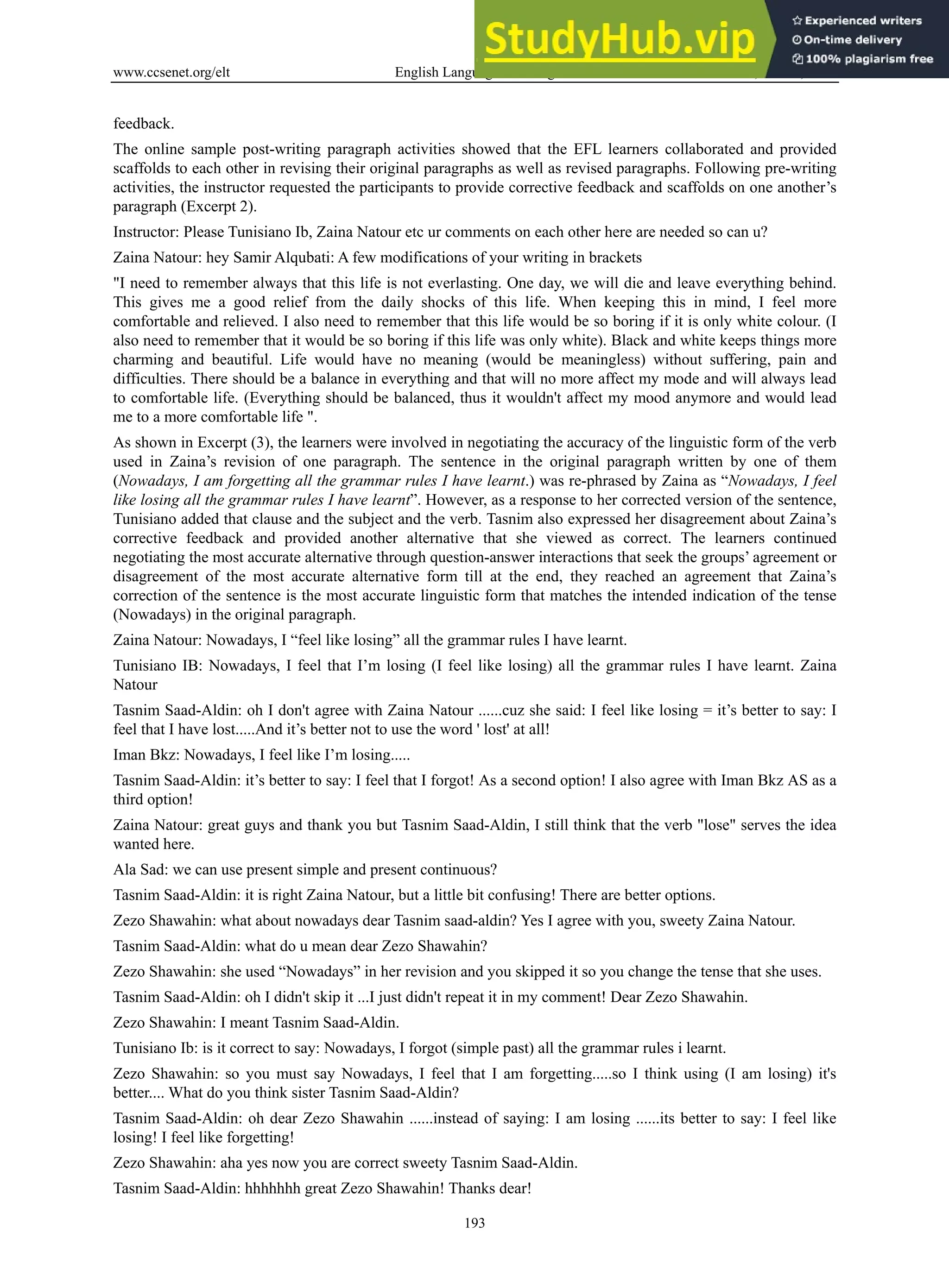
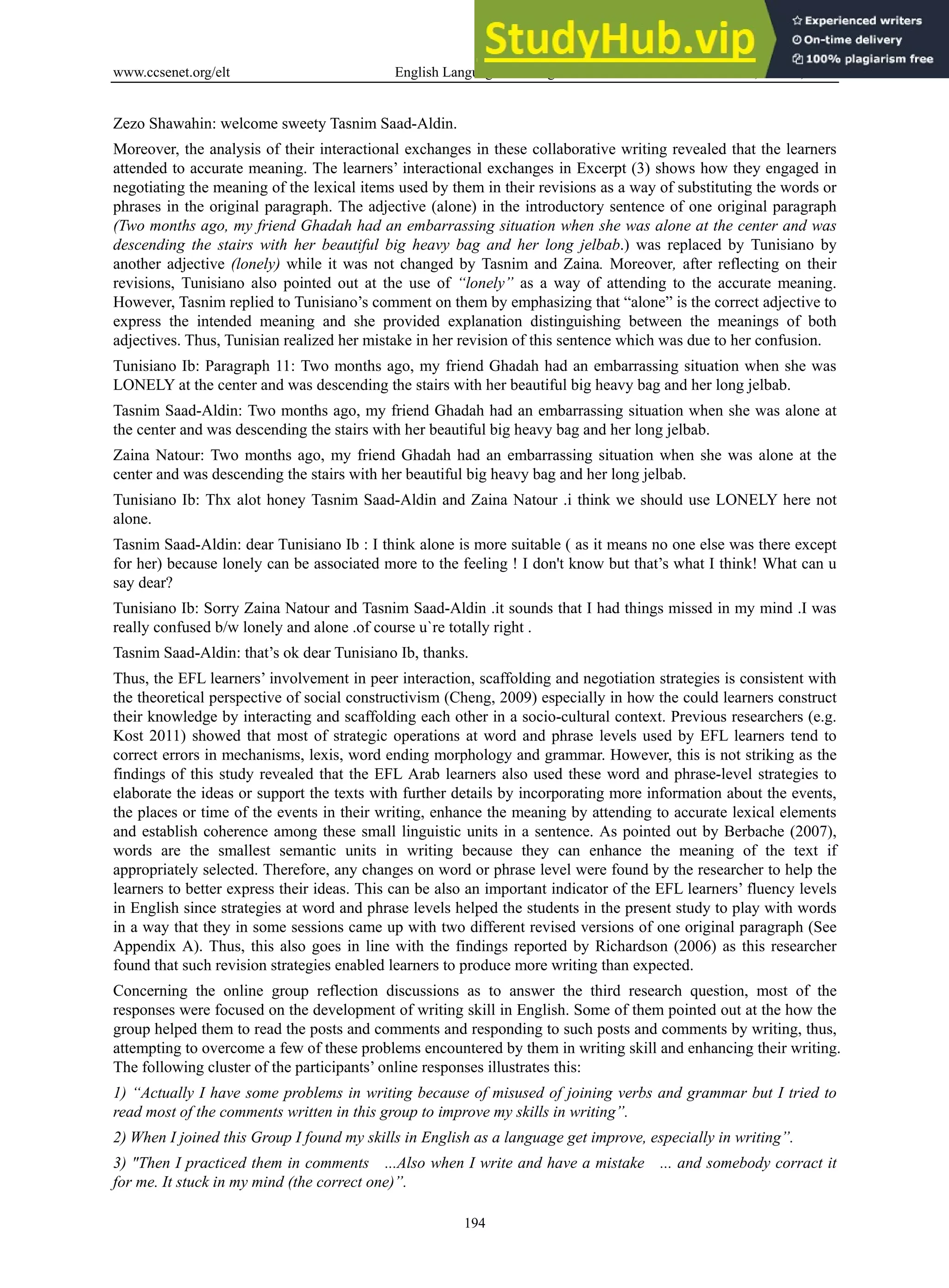
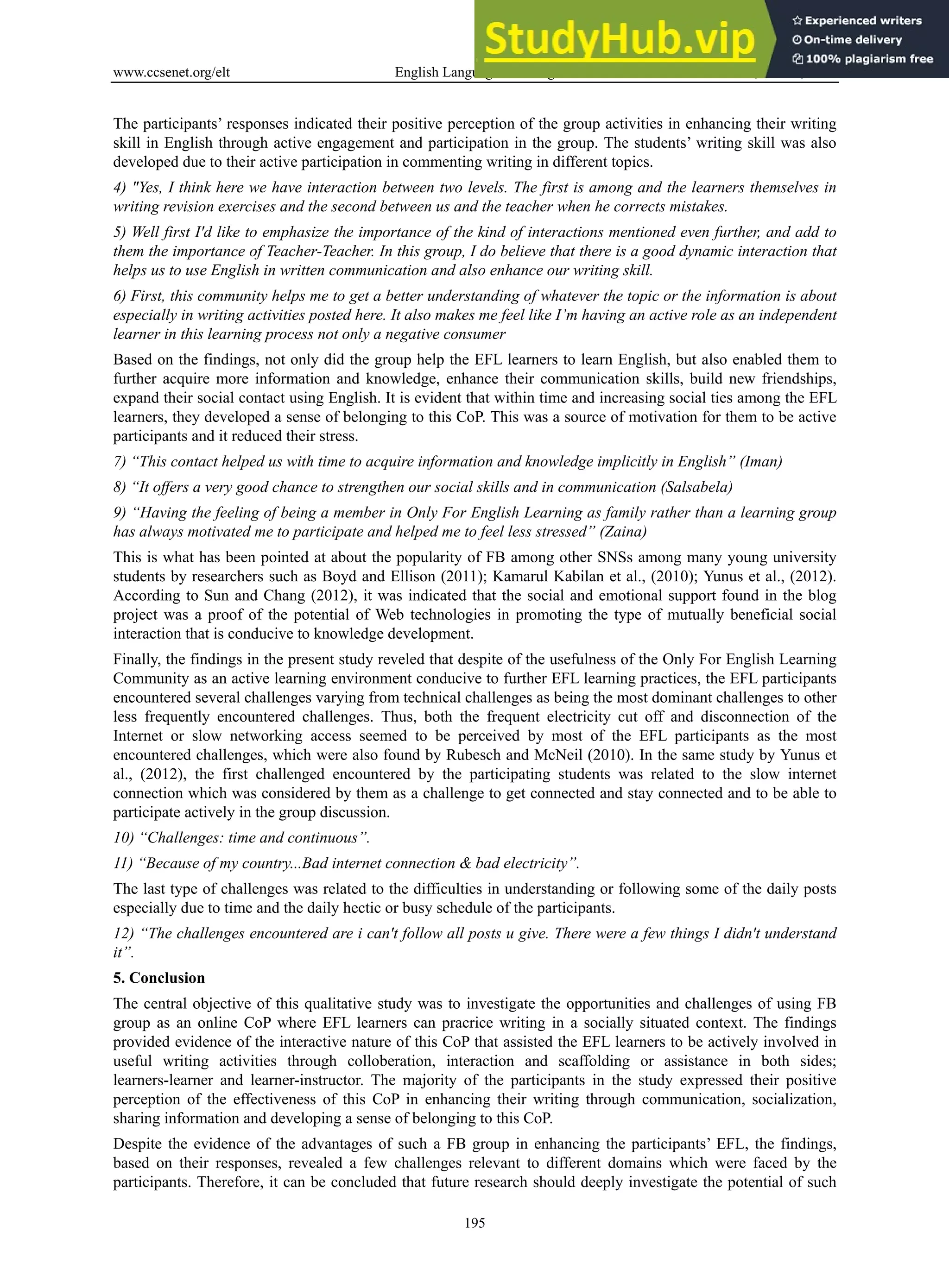
![www.ccsenet.org/elt English Language Teaching Vol. 6, No. 11; 2013
196
online FB communities of learning in EFL learners’ development in writing skill in English in relation to
socio-cultural theories, situated theories, etc. This can be achieved by conducting a deep content analysis of the
participants’ comments along with observations of their different participation patterns and roles.
Acknowledgements
On behalf of my supervisor and co-supervisor, I would like to thank the UKM for its research fund and support
in pursuing publishing our papers. Especial thankfulness should be dedicated to the UKM Pusat Pengurusan
Siswazah for the Zamalah. Finally, I am grateful to Prof. Norizan, my main supervisor, for her persistant support.
References
Barton, D., & Tusting, K. (2005). Beyond Communities of Practice: Language, Power and Social Contex. New
York: Cambridge University Press.
Beer, D., & Burrows, R. (2007). Sociology and, of and in Web 2.0: Some initial considerations. Sociological
Research Online, 12(5). Retrieved from http://www.socresonline.org.uk/12/5/17.html
Berbache, S. (2007). Improving EFL students’ writing through trained peer review (Master thesis). University of
Constantine, Algeria.
Boyd, D. M., & Ellison, N. B. (2011). Social network sites: Definition, history and scholarship. Retrieved from
http://mimosa.pntic.mec.es/mvera1/textos/redessocial es.pdf [16th March 2011]
Chapelle, C. A. (1994). CALL activities: Are all they the same? System, 22, 33-45.
Chapelle, C. A. (2003). English Language Learning and Technology. Amsterdam: John Benjamins.
Cheng, G. (2009). Using game making pedagogy to facilitate student learning of interactive multimedia.
Australasian Journal of Educational Technology, 25(2), 204-220. Retrieved from
http://www.ascilite.org.au/ajet/ajet25/cheng.html
Cloete, S., De Villiers, C., & Roodt, S. (2009). Facebook as an academic tool for ICT lecturers. Research
presented at the annual meeting of SACLA. Eastern Cape, South Africa. Retrieved from
http://www.academia.edu/849759/Facebook_as_an_academic_tool_for_ICT_lecturers
Ellis, R. (1999). Learning a second language through interaction. Amsterdam: John Benjamins.
Grandzol, C. J., & Grandzol, J. R. (2010). Interaction in online courses: More is not always better. Online
Journal of Distance Learning Administration, 13(2). Retrieved from
http://www.westga.edu/~distance/ojdla/summer132/Grandzol_Grandzol132.pdf
Haverback, H. (2009). Facebook: Uncharted territory in a reading education classroom. Reading Today.
Retrieved from http://www.citeulike.org/group/12747/article/6601834
Kamarul Kabilan, M., Norlida Ahmad, & Zainol Abidin, M. J. (2010). Facebook: An online environment for
learning of English in institutions of higher education? Internet and Higher Education, 13(4), 179-187.
http://dx.doi.org/10.1016/j.iheduc.2010.07.003
Kern, R. G. (1995). Restructuring classroom interaction with networked computers: Effects of quantity and
characteristics on language production. Modern Language Journal, 79, 457-476.
Kitade, K. (2000). L2 learners’ discourse and SLA theories in CMC: Collaborative interaction in internet chat.
Computer Assisted Language Learning, 13, 143-166.
Kost, C. (2011). Investigating writing strategies and revision behavior in collaborative wiki projects. CALICO
Journal, 28(3), 606-620.
Lampe, C., Wohn, D. Y., Vitak, J., Ellison, N. B., & Wash, R. (2011). Student use of Facebook for organizing
collaborative classroom activities. Computer-Supported Collaborative Learning, 6, 329-347.
Lave, J., & Wenger, E. (1991). Situated learning: Legitimate peripheral participation. Cambridge: Cambridge
University Press.
Lim, Y. H. (2012). Facebook in Asia: Total Users and Age Groups. Grey Review. Retrieved April 16, 2013, from
http://www.greyreview.com/2010/03/02/facebook-in-asia-totalusers-and-age-groups-latest-stats/
Liu, Y. (2010). Social media tools as a learning resource. Journal of Educational Technology Development and
Exchange, 3(1), 101-114.
Long, M. H. (1996). The role of linguistic environment in second language acquisition. In C. Ritchie, T. Bhatia,
& K. Bhatia (Eds.), Handbook of second language acquisition (pp. 413-468). San Diego: Academic Press.](https://image.slidesharecdn.com/adoptingsocialnetworkingsitessnssasinteractivecommunitiesamongenglishforeignlanguageefllearnersinwri-230805165105-a9b8c13f/75/Adopting-Social-Networking-Sites-SNSs-As-Interactive-Communities-Among-English-Foreign-Language-EFL-Learners-In-Writing-Opportunities-And-Challenges-10-2048.jpg)
